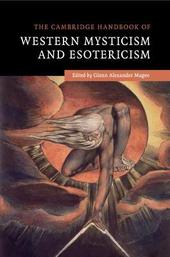
|
The Cambridge Handbook of Western Mysticism and Esotericism
Paperback / softback
Main Details
| Title |
The Cambridge Handbook of Western Mysticism and Esotericism
|
| Authors and Contributors |
Edited by Glenn Alexander Magee
|
| Physical Properties |
| Format:Paperback / softback | | Pages:514 | | Dimensions(mm): Height 230,Width 150 |
|
| Category/Genre | Philosophy of religion
History of religion
Mysticism |
|---|
| ISBN/Barcode |
9780521734912
|
| Classifications | Dewey:204.22 |
|---|
| Audience | | Professional & Vocational | | Tertiary Education (US: College) | |
|---|
| Illustrations |
Worked examples or Exercises
|
|
Publishing Details |
| Publisher |
Cambridge University Press
|
| Imprint |
Cambridge University Press
|
| Publication Date |
29 August 2019 |
| Publication Country |
United Kingdom
|
Description
Mysticism and esotericism are two intimately related strands of the Western tradition. Despite their close connections, however, scholars tend to treat them separately. Whereas the study of Western mysticism enjoys a long and established history, Western esotericism is a young field. The Cambridge Handbook of Western Mysticism and Esotericism examines both of these traditions together. The volume demonstrates that the roots of esotericism almost always lead back to mystical traditions, while the work of mystics was bound up with esoteric or occult preoccupations. It also shows why mysticism and esotericism must be examined together if either is to be understood fully. Including contributions by leading scholars, this volume features essays on such topics as alchemy, astrology, magic, Neoplatonism, Kabbalism, Renaissance Hermetism, Freemasonry, Rosicrucianism, numerology, Christian theosophy, spiritualism, and much more. This Handbook serves as both a capstone of contemporary scholarship and a cornerstone of future research.
Author Biography
Glenn Alexander Magee is Professor and Chairman of the Department of Philosophy at the C. W. Post Campus of Long Island University, New York. He is the author of Hegel and the Hermetic Tradition (2001) and The Hegel Dictionary (2011), as well as many articles on German philosophy and its connections with mysticism and esotericism.
Reviews'Glenn Alexander Magee has brought together a 'dream team' of scholars, and from an impressively broad range of generations, from esteemed senior doyens to emerging young intellectuals about to reshape the conversation once again. Magee also brings his own trademark philosophical clarity to the definitional and historical tasks at hand. The result is a cutting-edge collection of essays that delivers exactly what it promises: a concise and clear map of the hidden intellectual tradition of the West from ancient Greece to today.' Jeffrey J. Kripal, J. Newton Rayzor Professor of Religion, Rice University, Houston, and author of The Serpent's Gift: Gnostic Reflections on the Study of Religion 'This long-overdue collection contains work of the best minds of the field and is certain to advance current research in Western esotericism. A must purchase.' David Appelbaum, State University of New York, New Paltz 'It is impossible to understand our civilization without awareness of the immense influence upon it of mystical and esoteric ideas and practices. This generous collection of scholarly essays at last offers reliable support for the academic study of humanity's age-old and contemporary quest for higher levels of consciousness.' Jacob Needleman, San Francisco State University 'Contributors to this handbook are world-class - writers such as Wouter J. Hanegraaff and Kocku von Stuckrad, Antoine Faivre and Arthur Versluis. Each has written magisterially about the content and place of mysticism and esotericism, making this not merely an arcane field of intellectual inquiry but a living and contended area where theologians and historians, anthropologists and students of cultural and religious history engage and should do so. As exemplars of inquiry in their own right, the essays are excellent, thoughtfully expressed and contentious where they need to be, unpacking complex ideas such as those of Boehme and Swedenborg elegantly.' Stuart Hannabuss, Reference Reviews
|